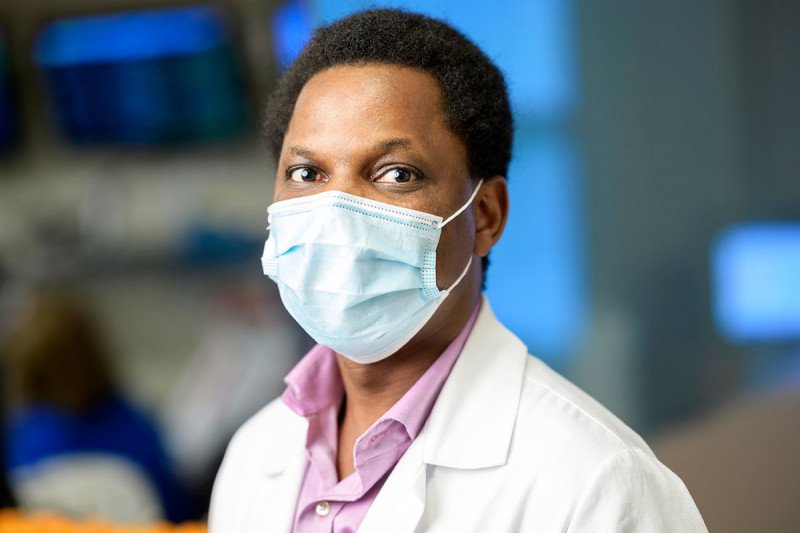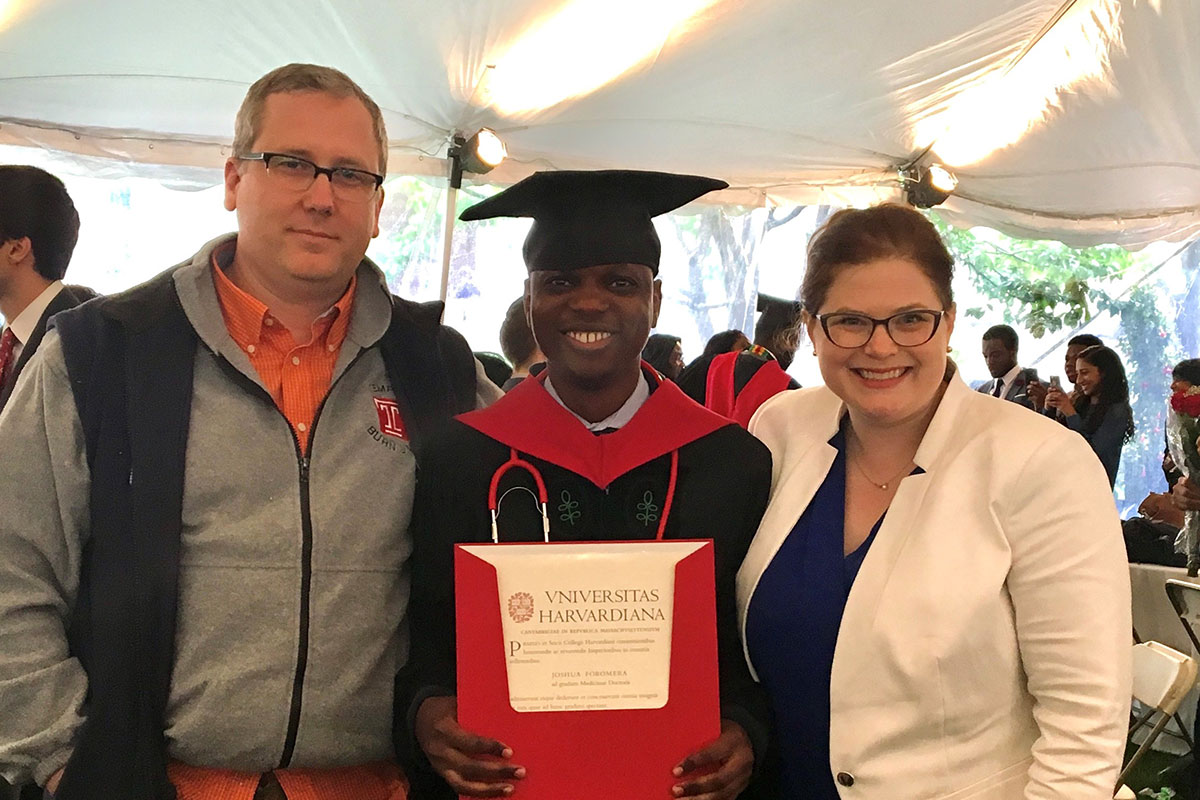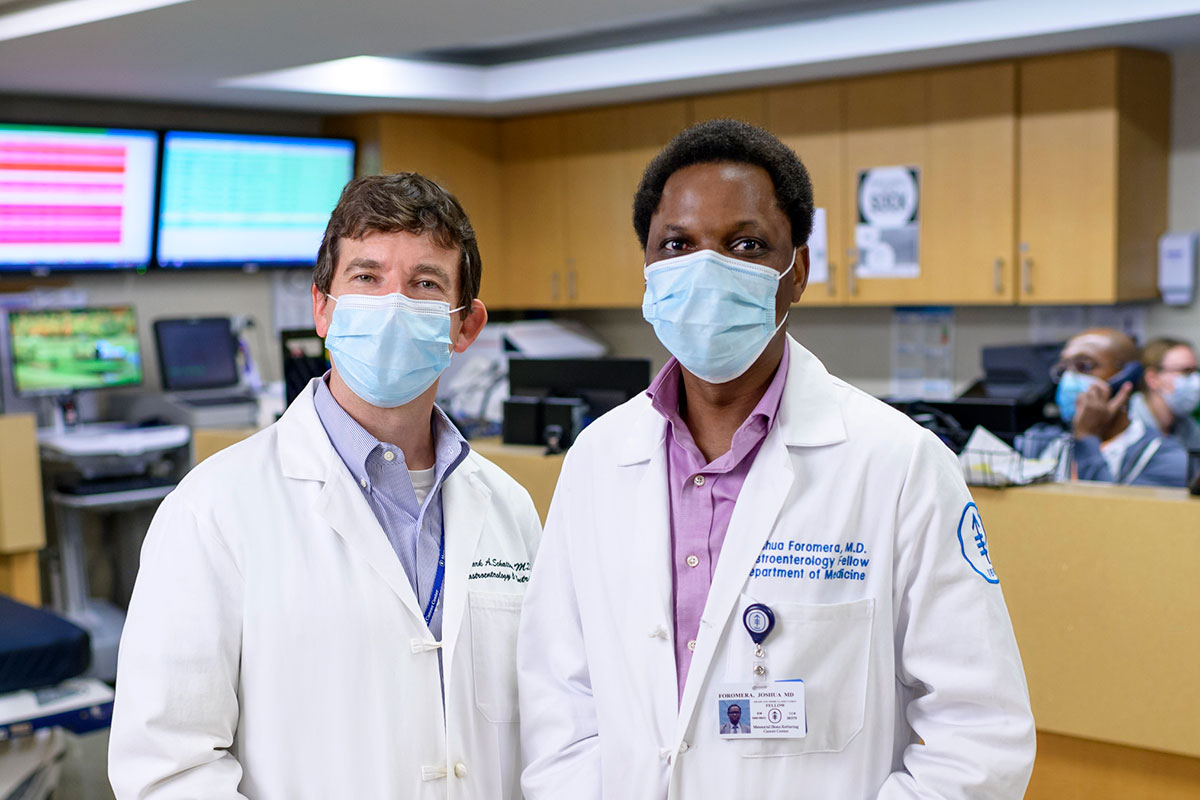
On July 1, Josh Foromera moved to New York City to begin his three-year fellowship in the Gastroenterology, Hepatology, and Nutrition Service, led by Service Chief Mark Schattner. Given the COVID-19 pandemic, it was a tough time to be new to the city — and it still is. But despite the challenges, he has happily immersed himself in life at MSK — a life that is a world away from the one he knew growing up.
Dr. Foromera was born and raised in Chivi, a small village in Zimbabwe in southern Africa. One of four children, he and his family lived like all their neighbors — on a small plot of land, with chickens and the occasional cow, eating food they grew. He spent his childhood swimming in a nearby river, joining his friends for games with a homemade ball, and taking the cows to pasture.
“We had no TV, no cell phones — it was idyllic,” he remembers.
It was also a place without a doctor. “Once a month, a doctor would come from the city to a Catholic mission outpost a few miles away, and everyone would go,” says Dr. Foromera. Seeing the community’s urgent need for healthcare made an impression on young Josh, fostering his early and seemingly far-fetched dream of becoming a doctor himself.

But Josh wasn’t the only one with dreams for his future. His father had been denied the chance to pursue an education and was determined that Josh would have a different fate. The sugar company where his father worked offered a few opportunities for employees’ children to attend high school in a nearby town. Since schooling was limited in his village, Josh moved to the town and lived there with his father for two years in a small house without electricity so he could finish high school.
At school, Josh found himself floundering in his first-ever chemistry class, confronted by the “foreign language” of chemical symbols. But his teachers stuck with him. “Teachers were paid based on how well their students did, so I was a real liability,” he jokes. Ultimately, his hard work and his teachers’ persistence paid off, and Josh excelled.
Life after High School
Upon graduating from high school, Josh’s dream of medical school seemed within reach. He received a grant from the Zimbabwe government to go to college, but it was withdrawn when the country faced a financial crisis. Josh’s father, still determined to see his son educated, sold their cows to pay for university, only to discover that the profit from the sale was only enough to pay for one semester. Plus, Josh had two younger sisters. “If my parents spent everything on me, my sisters wouldn’t have even gone to elementary school.”
Given the bleak outlook, Josh decided to go to South Africa to look for work. He didn’t tell his father.
He paid a truck driver $10 to let him hitch a ride to Beitbridge, the border town between his native country and South Africa. Josh arrived early in the morning with a day pass.
“They wouldn’t let me in,” says Dr. Foromera. “They knew I wasn’t coming for the day.”
In the first of what became an unfolding series of serendipitous events, an older woman noticed his trouble and approached him. “Today, you’re my son,” she said, and told the border guards the same thing, insisting that she needed her “son” to help her carry goods across the border.
Having gotten him inside South Africa, she wished him well and left him to find his own way. Josh caught a bus to Johannesburg, where his brother was living above a garage, and found work washing cars and busing tables in a restaurant. He also started sending money home, having told his father at that point about his whereabouts.
A Little Help from Some Friends
Once he was settled, Josh took to Facebook and tracked down a friend from high school who was studying at Duke University in North Carolina. The friend explained that Josh needed to take the SAT if he wanted to go to college in the United States — and so began Josh’s testing odyssey. He visited the US embassy in the capital city of Pretoria and asked to talk with someone in the education department. Embassy officials connected him with a public affairs representative, Carol Wilson, who let him borrow her Peterson’s SAT Prep Guide. That prep guide, Dr. Foromera says, became his bible.
“I poured myself into that book,” he says. Ms. Wilson also agreed to help him register for the test once he saved enough money for the fee. “I’d work until I saved $20, then give it to Carol, who held on to it for me. Eventually, I saved enough and was able to register with the College Board.” He took the test and did very well.
With little knowledge of American colleges, Josh followed in his friend’s footsteps and applied to Duke, one of the world’s most selective universities. Duke arranged for him to be interviewed as part of the application process by two recent graduates who were living in South Africa. Soon after, he learned that he had been accepted to Duke on a full scholarship. His bright future had begun.
He couldn’t sleep the night before his flight to the US — it was the first time he’d ever been on an airplane. His friend at Duke assured him that the plane wouldn’t fall out of the sky, although that did little to calm Josh’s anxiety. Once he arrived on campus, he found he couldn’t understand what anyone was saying because “everyone had an accent.” It was like his first foray into chemistry, when he had felt so lost and confused.
But the Duke grads who interviewed him, David and Megan, continued to be part of his life, providing ongoing support and encouragement. They had arranged for him to arrive early on campus and take part in an immersion program, where he met other international students and made friends. Eventually, the cadence of American English became familiar and he began to understand what people were saying. David and Megan, meanwhile, became his fast friends, and their families in Washington, DC, and New Hampshire, became his extended family.

Becoming a Doctor
After Duke, Josh went to Harvard Medical School, where he was mentored by gastroenterologist Joe Feuerstein and developed an interest in the gastrointestinal (GI) field. Upon receiving his medical degree, he moved to Colorado, where he completed his internship and residency in internal medicine at University of Colorado Hospital. At that point, having decided to pursue his interest in gastroenterology, he interviewed at MSK with Dr. Schattner and was fascinated to learn about the work performed by the GI team and the unique role of gastroenterologists at a cancer center like MSK.
“Josh is an outstanding addition to the GI service,” says Dr. Schattner. “He’s not only a talented doctor, but also a wonderful colleague. When we first met Josh and heard his inspiring story, we knew that we wanted MSK to be part of it — and wanted him to be part of MSK. We’re delighted that he’s with us.”
As a fellow in gastroenterology, Dr. Foromera is part of a diverse treatment team that aims to provide accurate diagnosis, disease monitoring, and treatment for cancer patients.
“We provide answers to huge questions,” he says. “And we involve patients in their care, which is such an important part of their treatment.”
“MSK is more than I could have imagined in a fellowship program,” he continues. “I’m grateful for the world-class education I’m receiving here and the opportunity to work alongside faculty who are at the vanguard of innovation and research.”

He relishes the daily challenges of caring for patients with complicated diagnoses, both on the floor and in the endoscopy suite. He also likes the pace at which medicine is practiced at MSK. “Everything happens so fast at MSK. It’s like medicine on steroids,” he says.
In addition to acquiring critical skills in endoscopy and expanding his clinical knowledge, Dr. Foromera hopes to use his time at MSK to develop his research skills. He looks forward to joining some of the ongoing research projects driven by GI faculty and is excited to explore his own ideas.
Looking Forward
One day, he knows he will return to the village where he grew up and care for the people there. “The villagers are so proud of me,” says Dr. Foromera. “They talk about me with people in nearby communities and feel a certain ownership.”
“The saying, ‘It takes a village,’ is so commonly heard in the US,” he explains. “But in Africa, it’s really true. My parents can’t claim me entirely — the whole village had a part in my upbringing.”
Dr. Foromera has come a very long way to realize how intense his connection is to his homeland and the people there who share news of his triumphs with strangers passing through. He has now seen something of the world — more than most of his hometown friends will ever see — and recognizes the vast opportunities and relationships the wide world offers. But he also understands the value — and the call — of home.
Plus, he says, he really misses the food.

